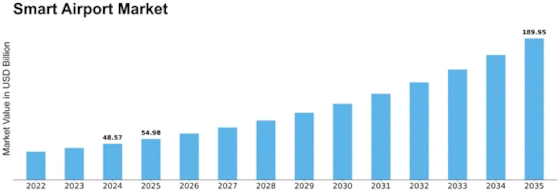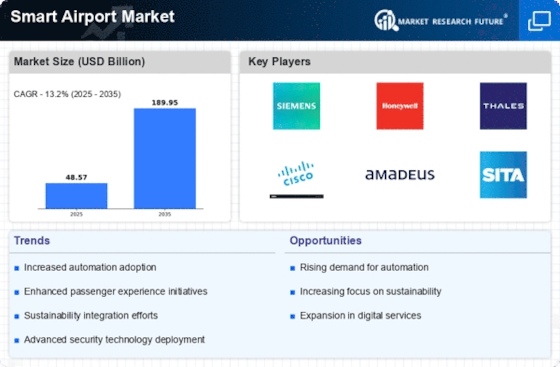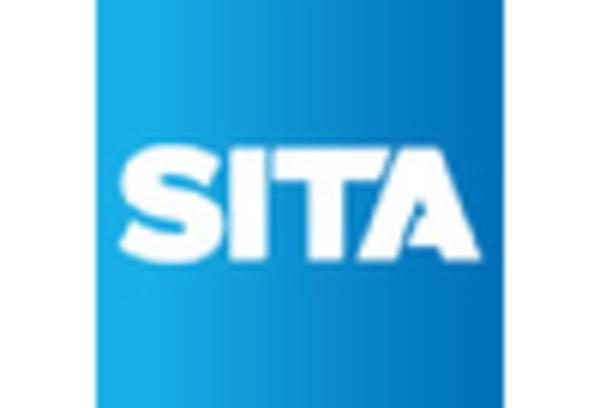Security Systems
Communication Systems
Cargo & Baggage Handling Control
Air/Ground Traffic Control
Passenger
Endpoint Devices
Others
Aeronautical Operations
Non-aeronautical Operations
Baggage Handling
Check-in Systems
Building Operations
Sustainable Energy Management
ATM
Resource Management
Aircraft Parking
Aircraft Maintenance
Others
North America Smart Airport by TechnologySecurity Systems
Communication Systems
Cargo & Baggage Handling Control
Air/Ground Traffic Control
Passenger
Endpoint Devices
Others
North America Smart Airport by ApplicationAeronautical Operations
Non-aeronautical Operations
North America Smart Airport by Terminal TypeBaggage Handling
Check-in Systems
Building Operations
Sustainable Energy Management
North America Smart Airport by AirsideATM
Resource Management
Aircraft Parking
Aircraft Maintenance
Others
US Smart Airport by TechnologySecurity Systems
Communication Systems
Cargo & Baggage Handling Control
Air/Ground Traffic Control
Passenger
Endpoint Devices
Others
US Smart Airport by ApplicationAeronautical Operations
Non-aeronautical Operations
US Smart Airport by Terminal TypeBaggage Handling
Check-in Systems
Building Operations
Sustainable Energy Management
US Smart Airport by AirsideATM
Resource Management
Aircraft Parking
Aircraft Maintenance
Others
CANADA Smart Airport by TechnologySecurity Systems
Communication Systems
Cargo & Baggage Handling Control
Air/Ground Traffic Control
Passenger
Endpoint Devices
Others
CANADA Smart Airport by ApplicationAeronautical Operations
Non-aeronautical Operations
CANADA Smart Airport by Terminal TypeBaggage Handling
Check-in Systems
Building Operations
Sustainable Energy Management
CANADA Smart Airport by AirsideATM
Resource Management
Aircraft Parking
Aircraft Maintenance
Others
Europe Smart Airport by TechnologySecurity Systems
Communication Systems
Cargo & Baggage Handling Control
Air/Ground Traffic Control
Passenger
Endpoint Devices
Others
Europe Smart Airport by ApplicationAeronautical Operations
Non-aeronautical Operations
Europe Smart Airport by Terminal TypeBaggage Handling
Check-in Systems
Building Operations
Sustainable Energy Management
Europe Smart Airport by AirsideATM
Resource Management
Aircraft Parking
Aircraft Maintenance
Others
Germany Outlook (USD Billion, 2019-2030)
Germany Smart Airport by TechnologySecurity Systems
Communication Systems
Cargo & Baggage Handling Control
Air/Ground Traffic Control
Passenger
Endpoint Devices
Others
Germany Smart Airport by ApplicationAeronautical Operations
Non-aeronautical Operations
Germany Smart Airport by Terminal TypeBaggage Handling
Check-in Systems
Building Operations
Sustainable Energy Management
Germany Smart Airport by AirsideATM
Resource Management
Aircraft Parking
Aircraft Maintenance
Others
France Smart Airport by TechnologySecurity Systems
Communication Systems
Cargo & Baggage Handling Control
Air/Ground Traffic Control
Passenger
Endpoint Devices
Others
France Smart Airport by ApplicationAeronautical Operations
Non-aeronautical Operations
France Smart Airport by Terminal TypeBaggage Handling
Check-in Systems
Building Operations
Sustainable Energy Management
France Smart Airport by AirsideATM
Resource Management
Aircraft Parking
Aircraft Maintenance
Others
UK Smart Airport by TechnologySecurity Systems
Communication Systems
Cargo & Baggage Handling Control
Air/Ground Traffic Control
Passenger
Endpoint Devices
Others
UK Smart Airport by ApplicationAeronautical Operations
Non-aeronautical Operations
UK Smart Airport by Terminal TypeBaggage Handling
Check-in Systems
Building Operations
Sustainable Energy Management
UK Smart Airport by AirsideATM
Resource Management
Aircraft Parking
Aircraft Maintenance
Others
ITALY Smart Airport by TechnologySecurity Systems
Communication Systems
Cargo & Baggage Handling Control
Air/Ground Traffic Control
Passenger
Endpoint Devices
Others
ITALY Smart Airport by ApplicationAeronautical Operations
Non-aeronautical Operations
ITALY Smart Airport by Terminal TypeBaggage Handling
Check-in Systems
Building Operations
Sustainable Energy Management
ITALY Smart Airport by AirsideATM
Resource Management
Aircraft Parking
Aircraft Maintenance
Others
Spain Smart Airport by TechnologySecurity Systems
Communication Systems
Cargo & Baggage Handling Control
Air/Ground Traffic Control
Passenger
Endpoint Devices
Others
Spain Smart Airport by ApplicationAeronautical Operations
Non-aeronautical Operations
Spain Smart Airport by Terminal TypeBaggage Handling
Check-in Systems
Building Operations
Sustainable Energy Management
Spain Smart Airport by AirsideATM
Resource Management
Aircraft Parking
Aircraft Maintenance
Others
Rest Of Europe Smart Airport by TechnologySecurity Systems
Communication Systems
Cargo & Baggage Handling Control
Air/Ground Traffic Control
Passenger
Endpoint Devices
Others
REST OF EUROPE Smart Airport by ApplicationAeronautical Operations
Non-aeronautical Operations
REST OF EUROPE Smart Airport by Terminal TypeBaggage Handling
Check-in Systems
Building Operations
Sustainable Energy Management
REST OF EUROPE Smart Airport by AirsideATM
Resource Management
Aircraft Parking
Aircraft Maintenance
Others
Asia-Pacific Smart Airport by TechnologySecurity Systems
Communication Systems
Cargo & Baggage Handling Control
Air/Ground Traffic Control
Passenger
Endpoint Devices
Others
Asia-Pacific Smart Airport by ApplicationAeronautical Operations
Non-aeronautical Operations
Asia-Pacific Smart Airport by Terminal TypeBaggage Handling
Check-in Systems
Building Operations
Sustainable Energy Management
Asia-Pacific Smart Airport by AirsideATM
Resource Management
Aircraft Parking
Aircraft Maintenance
Others
China Smart Airport by TechnologySecurity Systems
Communication Systems
Cargo & Baggage Handling Control
Air/Ground Traffic Control
Passenger
Endpoint Devices
Others
China Smart Airport by ApplicationAeronautical Operations
Non-aeronautical Operations
China Smart Airport by Terminal TypeBaggage Handling
Check-in Systems
Building Operations
Sustainable Energy Management
China Smart Airport by AirsideATM
Resource Management
Aircraft Parking
Aircraft Maintenance
Others
Japan Smart Airport by TechnologySecurity Systems
Communication Systems
Cargo & Baggage Handling Control
Air/Ground Traffic Control
Passenger
Endpoint Devices
Others
Japan Smart Airport by ApplicationAeronautical Operations
Non-aeronautical Operations
Japan Smart Airport by Terminal TypeBaggage Handling
Check-in Systems
Building Operations
Sustainable Energy Management
Japan Smart Airport by AirsideATM
Resource Management
Aircraft Parking
Aircraft Maintenance
Others
India Smart Airport by TechnologySecurity Systems
Communication Systems
Cargo & Baggage Handling Control
Air/Ground Traffic Control
Passenger
Endpoint Devices
Others
India Smart Airport by ApplicationAeronautical Operations
Non-aeronautical Operations
India Smart Airport by Terminal TypeBaggage Handling
Check-in Systems
Building Operations
Sustainable Energy Management
India Smart Airport by AirsideATM
Resource Management
Aircraft Parking
Aircraft Maintenance
Others
Australia Smart Airport by TechnologySecurity Systems
Communication Systems
Cargo & Baggage Handling Control
Air/Ground Traffic Control
Passenger
Endpoint Devices
Others
Australia Smart Airport by ApplicationAeronautical Operations
Non-aeronautical Operations
Australia Smart Airport by Terminal TypeBaggage Handling
Check-in Systems
Building Operations
Sustainable Energy Management
Australia Smart Airport by AirsideATM
Resource Management
Aircraft Parking
Aircraft Maintenance
Others
Rest of Asia-Pacific Smart Airport by TechnologySecurity Systems
Communication Systems
Cargo & Baggage Handling Control
Air/Ground Traffic Control
Passenger
Endpoint Devices
Others
Rest of Asia-Pacific Smart Airport by ApplicationAeronautical Operations
Non-aeronautical Operations
Rest of Asia-Pacific Smart Airport by Terminal TypeBaggage Handling
Check-in Systems
Building Operations
Sustainable Energy Management
Rest of Asia-Pacific Smart Airport by AirsideATM
Resource Management
Aircraft Parking
Aircraft Maintenance
Others
Rest of the World Smart Airport by TechnologySecurity Systems
Communication Systems
Cargo & Baggage Handling Control
Air/Ground Traffic Control
Passenger
Endpoint Devices
Others
Rest of the World Smart Airport by ApplicationAeronautical Operations
Non-aeronautical Operations
Rest of the World Smart Airport by Terminal TypeBaggage Handling
Check-in Systems
Building Operations
Sustainable Energy Management
Rest of the World Smart Airport by AirsideATM
Resource Management
Aircraft Parking
Aircraft Maintenance
Others
Middle East Smart Airport by TechnologySecurity Systems
Communication Systems
Cargo & Baggage Handling Control
Air/Ground Traffic Control
Passenger
Endpoint Devices
Others
Middle East Smart Airport by ApplicationAeronautical Operations
Non-aeronautical Operations
Middle East Smart Airport by Terminal TypeBaggage Handling
Check-in Systems
Building Operations
Sustainable Energy Management
Middle East Smart Airport by AirsideATM
Resource Management
Aircraft Parking
Aircraft Maintenance
Others
Africa Smart Airport by TechnologySecurity Systems
Communication Systems
Cargo & Baggage Handling Control
Air/Ground Traffic Control
Passenger
Endpoint Devices
Others
Africa Smart Airport by ApplicationAeronautical Operations
Non-aeronautical Operations
Africa Smart Airport by Terminal TypeBaggage Handling
Check-in Systems
Building Operations
Sustainable Energy Management
Africa Smart Airport by AirsideATM
Resource Management
Aircraft Parking
Aircraft Maintenance
Others
Latin America Smart Airport by TechnologySecurity Systems
Communication Systems
Cargo & Baggage Handling Control
Air/Ground Traffic Control
Passenger
Endpoint Devices
Others
Latin America Smart Airport by ApplicationAeronautical Operations
Non-aeronautical Operations
Latin America Smart Airport by Terminal TypeBaggage Handling
Check-in Systems
Building Operations
Sustainable Energy Management
Latin America Smart Airport by AirsideATM
Resource Management
Aircraft Parking
Aircraft Maintenance
Others



















Leave a Comment